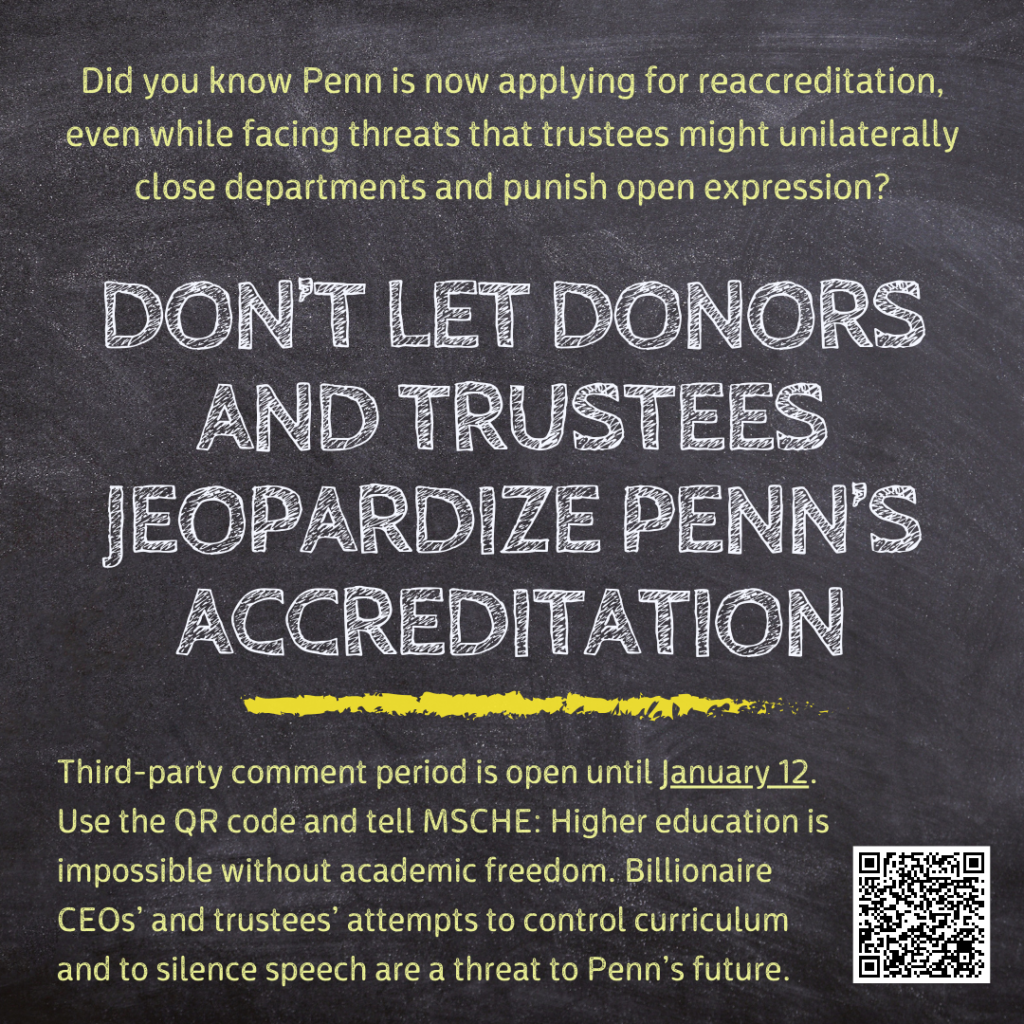Statement by AAUP-Penn Executive Committee on the Suppression of Student and Faculty Dissent
On April 23, in response to university administrators’ deployment of repressive force against students and faculty engaged in peaceful protests at Columbia, NYU, and several other campuses, as well as the infringement of the associational rights of student groups at many universities including our own, the Executive Committee of AAUP–Penn released the following public statement to Penn’s central administration and to media contacts as well as to our chapter’s membership:
***
Statement by AAUP-Penn Executive Committee on the Repression of Student and Faculty Dissent
April 23, 2024
We condemn in the strongest terms the wave of recent repression of students and faculty engaged in peaceful and principled protest by university administrations across the country. These include the draconian treatment of students by the administrations of Barnard and Columbia, aided by the NYPD whom administrators called to campus for the first time since 1968, expressly without the consent of the Columbia University Senate and thus in direct violation of shared governance. They also include copycat crackdowns on peaceful protesters at Yale University and at NYU, both of which authorized police to assault and arrest their own faculty and students—reportedly including the pepper spraying of legal observers and student journalists. These crackdowns extend and intensify the capricious and one-sided suppression of dissent at Penn this year, most recently seen in the unjustified ban of the student group Penn Against the Occupation. The sheer volume of administrative actions in violation of university statutes, shared governance, and faculty and student rights is too large to catalog in this statement, which itself reveals the perilous environment university administrations have created on our campuses. Notably, these administrations have repeatedly and consistently shown themselves to be biased in their selective suppression of students and faculty critical of Israel’s war on Palestinians, often apparently at the behest of right-wing donors, politicians, alumni, and lobbying groups. They purport to be concerned about the safety of Jewish students while actively suppressing the rights of Jewish students and faculty who express their own criticism of the current war on Gaza, and conflating antisemitism with all criticism of the State of Israel, which makes no one safer. Meanwhile, they show utter disdain for the safety and rights of Palestinian, Arab, Muslim, Persian, and other students and faculty offering the same criticism. As a result, with few notable exceptions, university administrators’ accounts of their actions can no longer be trusted, and their statements affirming an ostensible commitment to student safety—made while threatening or deliberately unleashing police violence on their own peaceably assembled students and faculty—have lost all credibility.
We echo our colleagues in AAUP-Columbia, AAUP-Barnard, and NYU-AAUP in demanding that all suspensions of their students be dismissed, all charges against their students be dropped and their records cleared, and the rights of faculty and students to peacefully protest be restored immediately and respected going forward. We are watching, in particular, to make sure that non-tenure-track and untenured faculty, students and faculty of color, and LGBTQ+ faculty and students—who are a significant number of those arrested and charged—do not face retaliatory actions from these universities. We demand the same of Penn’s administration, and call specifically for Penn Against the Occupation to be reinstated, and we call for the administration to cease its abuse of the student disciplinary system to silence and punish legitimate forms of speech, protest, and assembly. Our university administration must end its campaign of one-sided suppression of political dissent, which discredits the entire institution’s commitment to academic freedom, open expression, free inquiry, and freedom of association. We further demand that disciplinary procedures against students at Penn and at campuses across the country be reviewed and revised by faculty and students, not administrators, to protect the freedoms and due process rights of all. Finally, we demand that all universities cease the abhorrent practice of turning armed police on peaceful demonstrators.
While in the immediate term university administrators might seem to have demonstrated their own power, the draconian nature of their actions reveals the weakness of their position. We are confident that students, faculty, and staff who ally together in peaceful dissent against injustice will carry the day. The Executive Committee of AAUP-Penn stands with our colleagues, students, and allies in our national AAUP and at Columbia, Barnard, Yale, NYU, the University of Michigan, Pomona College, Stony Brook University, the City University of New York, Vanderbilt University, the University of Minnesota, Cal Poly Humboldt, and beyond, and we commit ourselves to a more just future for all.
***








